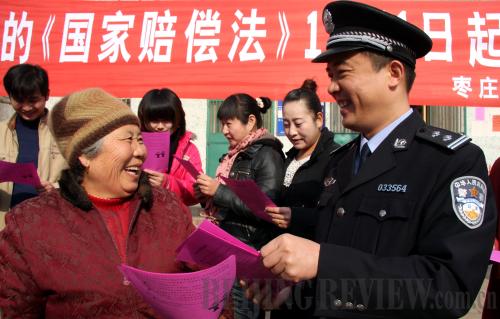|
 |
|
LEGAL AWARENESS: A police officer distributes leaflets on the amended State Compensation Law to local residents in Zaozhuang, Shandong Province, on November 30, 2010, a day before the new law went into effect (XINHUA) |
On May 5, Lin Qilei, a lawyer with the Beijing-based Ruikai Law Firm, sent out two express letters to the finance departments of central China's Henan Province and east China's Zhejiang Province, requiring them to publicly release details of funds used for compensating victims in two erroneously convicted cases in their jurisdiction.
Zhao Zuohai, a local farmer in Henan, wrongfully served 10 years in jail on a murder conviction until he was acquitted in May 2010. Authorities gave him 650,000 yuan ($104,130) in compensation. The case in Zhejiang concerns Zhang Hui and his uncle, Zhang Gaoping, who were given compensation of 2.21 million yuan ($354,042) in May 2013 after they were acquitted of a murder charge they had also wrongfully served 10 years in prison for.
"Compensation recovery and accountability are vague under the State Compensation Law. There are no clear stipulations, which has led to delays and even failure to pay out," Lin said.
In the State Compensation Law, there are only clauses stating that after the liable organs give the compensation, they have the responsibility to order functionaries, entrusted organizations or other persons responsible for the gross negligence to pay the compensation in part or in full. Persons responsible for severe negligence shall be punished, according to the law.
Lin suggests setting up a special compensation recovery and accountability mechanism and further perfecting the supervision procedures that could close this loophole.
Seeking the truth
China's compensation system is based on the State Compensation Law. The law was first established in 1995 and then amended in 2010.
The amendment grants citizens, legal entities or other organizations greater power to obtain compensation when their lawful rights and interests are infringed upon by state organs or their functionaries as a result of them enforcing their power.
Although China has established a basic state compensation system, it is not transparent enough, Lin said.
Before his two letters on May 5, Lin delivered another request to the Finance Department of north China's Inner Mongolia Autonomous Region on April 24 for the details of compensation recovery concerning another case.
Wang Benyu, who was wrongfully sentenced to death with a two-year reprieve for rape and murder, received 1.5 million yuan ($240,300) in compensation in April, after the real murderer confessed.
Wang, a 60-year-old farmer from southwest China's Sichuan Province, had worked as a migrant worker in north China's Hebei Province and Inner Mongolia since he left his hometown in 1991.
On December 15, 1994, Wang's colleague Li Yanming raped and killed a woman in Baotou, Inner Mongolia, and threatened to kill Wang if he reported the crime to the police. Wang helped Li dispose of the body and allowed Li to escape. The next day, the police detained Wang as the primary suspect. Wang was later sentenced to death with a two-year reprieve in November 1996 and all of his appeals were ignored.
In 2012, Li was caught in Beijing for committing other crimes and confessed that he raped and killed the woman in Baotou in 1994. In September 2013, Wang's crime was amended to harboring a fugitive and his sentence was reduced to three years' imprisonment, entitling him to compensation for the extra time he should not have served.
"After the ruling that he was to be given compensation, I haven't seen any further action from the relevant departments to punish those persons responsible or to recover the compensation from them," Lin said.
The situation motivated Lin to request that the source of the 1.5-million-yuan compensation be made public as well as the names and job titles of the persons responsible for the wrongful conviction.
On May 18, Lin received replies from Inner Mongolia and Henan, but the responses were not adequate, according to Lin.
The Finance Department of Inner Mongolia replied that they were not involved in sourcing the compensation and suggested Lin seek answers from the finance authorities in Baotou. The department also suggested he apply to the judicial departments of the region or Baotou for further details.
| 